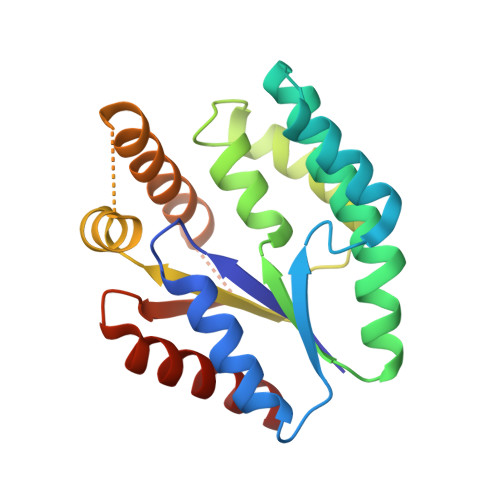In Vivo Validation of Thymidylate Kinase (TMK) with a Rationally Designed, Selective Antibacterial Compound.
Keating, T.A., Newman, J.V., Olivier, N.B., Otterson, L.G., Andrews, B., Boriack-Sjodin, P.A., Breen, J.N., Doig, P., Dumas, J., Gangl, E., Green, O.M., Guler, S.Y., Hentemann, M.F., Joseph-McCarthy, D., Kawatkar, S., Kutschke, A., Loch, J.T., McKenzie, A.R., Pradeepan, S., Prasad, S., Martinez-Botella, G.(2012) ACS Chem Biol 7: 1866-1872
- PubMed: 22908966
- DOI: https://doi.org/10.1021/cb300316n
- Primary Citation of Related Structures:
4GFD - PubMed Abstract:
There is an urgent need for new antibacterials that pinpoint novel targets and thereby avoid existing resistance mechanisms. We have created novel synthetic antibacterials through structure-based drug design that specifically target bacterial thymidylate kinase (TMK), a nucleotide kinase essential in the DNA synthesis pathway. A high-resolution structure shows compound TK-666 binding partly in the thymidine monophosphate substrate site, but also forming new induced-fit interactions that give picomolar affinity. TK-666 has potent, broad-spectrum Gram-positive microbiological activity (including activity against methicillin-resistant Staphylococcus aureus and vancomycin-resistant Enterococcus), bactericidal action with rapid killing kinetics, excellent target selectivity over the human ortholog, and low resistance rates. We demonstrate in vivo efficacy against S. aureus in a murine infected-thigh model. This work presents the first validation of TMK as a compelling antibacterial target and provides a rationale for pursuing novel clinical candidates for treating Gram-positive infections through TMK.
- AstraZeneca Infection Innovative Medicines, 35 Gatehouse Drive, Waltham, Massachusetts 02451, United States. thomas.keating@astrazeneca.com
Organizational Affiliation:

















